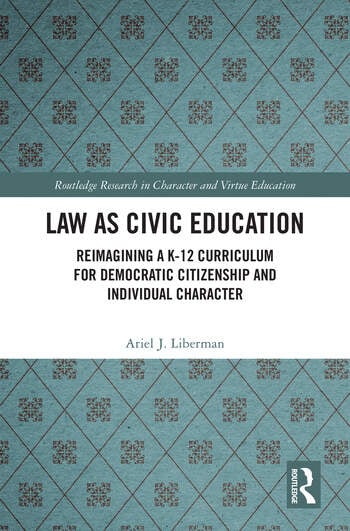
An Empowering Civic Education through Law Learning
Ariel Liberman
The following is an excerpt from Chapter 4 of Ariel Liberman’s new book, Law as Civic Education: Reimagining a K-12 Curriculum for Democratic Citizenship and Individual Character (Copyright 2025 by Imprint). Reproduced by permission of Taylor and Francis Group.
At first blush, the notion of teaching something as complicated as law learning to primary and secondary school students may seem far-fetched. To be sure, I am not proposing to enroll 12-year-olds in intensive substantive criminal procedure and trial techniques classes. The vision I maintain for the citizen—congruent with [Martha] Nussbaum—is not outcome-oriented, i.e., to create a nation of lawyers (heaven forbid!), but rather the manipulation of an augmented legal education to build capacity and capability to think and hold a sophisticated conversation, under- stand systems and involve themselves in the national community and national challenges. And, congruent with [John] Dewey and [Lawrence] Kohlberg, learning law is an ethical education, instilling values we would identify with American citizenship (enshrined in the legal codes and common law) while also being values-plural in posture and approach, an education complementary to values learned through the family or faith community. The objective of the sections below is to defend each of these positions and build out a case for law as an empowering civics education.

This proposal is unique from other law learning models that teach citizens technical laws, means of exercising rights, or the ability to discern when a law is applicable in this or that case. Law learning is born out of the conception that law offers students a set of skills (mental and practical) or tools in one’s toolbox (namely, legal reasoning or law-think and facility with political institutions) that can elevate the way one goes about their role as citizen. The theory of law learning proposes that students should be exposed to the “idea of law and the American system” early on, and teachers should provide the means to engage with the law’s problems, challenges, values, and premises. In this way, students might then go on to be social revolutionaries, idealogues, lawyers, activists … or none of those things; law learning is empowering not for the roles it necessarily opens for students, but for the common rhetoric it facilitates in all citizens, the common understanding, the common capabilities, the common appreciations of our institutions that provide a baseline for citizens to flourish or act—if they want to do so—in America’s political milieu. What I am concerned with here, indeed, is cultivating higher reasoning skills and substantive systems-awareness necessary for all citizens.
It should come as no surprise that teaching law—a subject that features a plethora of desirable learning outcomes and is itself a dynamic force— in childhood education is no novel concept. But, of course, it is not always done in a constructive way. Hong Kong is one example where, in 2001, they announced a change to their national civics education which incorporated the act of learning their Constitution, the Basic Law, and national security education. This was then complimented with a moral and ethical education. Born out of a familiar concern that the younger generation’s “passive attitudes” might “undermine society’s development in the long term,” their “Values and Education Curriculum Framework” was designed to “cultivate national pride and empower citizens to participate in civic functions diligently and effectively.” It is a similar objective to the one I propose here, yet Hong Kong’s approach has one fundamental distinction: the government de-emphasized the cultivation of critical thinking skills, mobilizing law learning to set “standards behind which people judge right and wrong, their decisions, behavior, and attitudes.” Students ideally would then take greater care to weigh their opposition to this or that policy against the “country’s welfare and the values held by society.”
This is not our project of learning law for the purposes of this manuscript. To learn law in this context, and what the above example serves to distinguish, is not to confer standards, and values or to indoctrinate. Rather, the act of learning law must teach students the opposite: how to ask questions, how to think about values and rights, and how to form informed opinions. My position is that this new curriculum will help deconstruct large and daunting institutions and institutional ideals for students—ideals now explored only descriptively—so that the American system can become more accessible to younger students, and the propensity for creative innovation more familiar.
A Point of Comparison: The Jewish Tradition, a Culture of Learning Law
There is a balance that needs to be struck between respecting law and its institutions on the one hand and critically appraising it, developing it on the other hand. A law education for all citizens is the first step; and to show how successful such an educational innovation can, allow me a slight diversion into a parallel world where this has been commonplace for centuries—one, in fact, from which this whole manuscript draws inspiration: the Jewish Tradition.
Owing to a history of external persecution in diasporic experience, Judaism is incredibly developed in terms of their reasoning—their how, to what end, and why—for teaching children (Jewish) law young as a means of cultural preservation. Judaism’s educational tool is one focused on building a better citizen of the Jewish community. The Jewish duty to educate necessarily requires learning what Jewish Law is and how Jewish law works, both for oneself and one’s children, given halakha’s “intentional blending of law, personal ethics, and sense of community connectedness.” More specifically, studying halakha is about equipping the students with an understanding of how law functions, what arguments are at play on a given question, how can and should people act properly within and “evolving Jewish law.” Indeed, Jewish law learning is a civics education—intentionally educating for the betterment of Jewish peoplehood and citizenship. And it is one that is mandated for adults and children. Exploring what law learning looks like in the Jewish Tradition, substantively and practically, is instructive as we try and envision a national civic education project.
Substantively, the study of “Jewish law” includes working with all different aspects of the tradition, including those law discussions that have no practical application to modern life. Anybody connected to traditional Jewish communities would see this is directly part of a standard seminary curriculum. But why study law, and especially law that has no real impact on daily life? There are two main reasons I would like to focus on. The first is the wisdom gained in the very process of working with law, or, in other words, the benefits of learning to think deeply about principles through text. The second is about becoming “acculturated” to thinking about legal structures and ideas in higher ways and understanding how laws are developed by Jewish actors. The importance of learning law for its own sake, is, to the mind of Jewish people, the mechanism by which their culture and tradition passes down through generations.
The prospect of pouring over a common history, value-set, ideals, and principles every time one opens a page of Talmud, re-envisioning and reinterpreting the law’s meaning through ages and varied places, ensures the Jewish community remains connected and that individuals are conscientious of their role in perpetuating this connection. Indeed, this supposed to be an exercise so deeply engrained in Jewish Life—taking place daily, at fixed times and in fixed places every day—to become routine and habit. I take this rigorous commitment, as well as the embedded nature of law learning in Jewish Tradition, as part of a larger observation: for the Jewish people, law is a cultural tool, a value-set, a rule-book that ought to be well-accessible and well-studied by as many people as possible as the primary vehicle by which one learns to “play the game” of Judaism.
Learning law is a community citizenship education, a professionalization process, and a developmental tool; to the Jewish community the skills one acquires through law learning, especially higher reasoning, ensures that the next generations grow to be filled with impactful, thoughtful citizens and capable actors. Law is just one other course subject in primary and secondary schools meant to provide children with the tools necessary to be productive adults in the real world. As Rabbi Zauderer articulates, “each person is obligated to learn each day Tanach (Bible), Mishnah, Talmud, and Halacha (Jewish law). However, if he only has time to learn one thing, then it should be halacha, which is most practical for him to know what to do in his daily life.”
With this, Zauderer captures an essential idea: one cannot operate (Jewishly) effectively—critically, rationally, community-mindedly—without understanding Jewish law and the skills obtained by learning it.
In the seminary, pouring over pages of Talmud, children learn not only how to apply a general rule to a situation, but also how to think about the ways in which laws are applied. For example, a student might be asked to consider whether a general rule, “no carrying on Shabbat” applies to one who, say, pushes a stroller, or operates a self-driving car, or hitches a ride with a friend who is driving. While many students could offer quick answers, seminary children will learn the reasoning, rhetoric, and explanations behind the prohibition, arrive at conclusions, and, importantly, recognize the complexity and nuance needed to engage in public life within the Jewish community. Part of the instruction (and a very advantageous aspect of the education) is to help children learn to reason by more than one method: more than just by logic, Jewish Law reasons by analogy and analysis, and it recognizes both the value of adhering to precedent and innovation, or how the needs of the time serve a role in developing Jewish Law.
Jewish Law understands that “while a system can have precedent, it must still be able to change.” On this note, it is important to realize that the Jewish Tradition is ever active in a process of chiddush, reanalysis, and innovation of sources to find a novel solution to a problem. Students of Jewish Law seek out “novel and innovative truth to ancient problems, and the community is often witness to (and involved in) the process by which a new idea becomes normative.” It begins, familiarly, with reasoning by analysis and by argument from deeply important, binding core texts as well as countless important medieval and post-medieval texts that need to be understood and analyzed. The students learn to read and understand texts and codes, and from there apply them to novel considerations. These individuals, capable of harmonizing seemingly incompatible texts and understanding which tools to apply depending on the types of contradictions a text presents, is one way of being accustomed to a model of thinking that is nuanced and complex. Indeed, reasoning by analogy empowers the student to understand that each situation one encounters may share similarities with others but is nevertheless unique.
Students of Jewish law, being required from an early age to embark on a moral and religious learning experience, cultivate a culture of community-orientation, and develop good citizen characteristics with common mindsets, as well as key analytical abilities, truly think differently. To be taught essential skills in formal classrooms, educated morally by parents practicing the faith, connected to the community, and pushed to succeed professionally—are all congruent with the aims of learning Jewish Law young. And, indeed, we see the results made manifest in examining how Jewish adults approach education, continued and ongoing learning, and connecting with community. (And, assuredly, this can be an analogously inspired education in our country.)
Moving back to the wider national conversation, to follow the law is to preserve order and confer necessary legitimacy upon the system. A legal reasoning education endows a perpetual appreciation for the multi-layered nature of the system and the competing interests of laws and policy, as well as provides for a mental shift toward criticality and curiosity, higher-reasoning, and motivation to interact theoretically with the system that governs you. At the same time, this is not equivalent to indoctrination; students are able to evaluate the inherent injustice of a law and commensurately practice all manner of civil and private disobedience in contexts where a moral obligation seems to supersede any duty to obey. Indeed, such an education endows them with an even greater capacity for doing so, as well as a commensurately higher standard by which to judge injustice. A legal education empowers one to reflect deeply on the very basis
for injustice and its bearing on the larger system, and, in the event of a need to respond, do so by informed, efficient and legitimate means. In other words, an education in the “rule of law” translates to tempered responses; painstakingly considered circumstances, and informed judgments about policy.
Just as the act of learning a little history in school is helpful for the student to understand their socio-cultural milieu in context, so too is learning a little “law learning” is helpful to balance legal obedience with institutional awareness and healthy criticism of authority. While certainly law-think is not about standards, nor is it about obeying the law blindly—though the respect they gain for the law may indeed impugn them to do so—it is about combatting complacency, working together, hearing each other out, and cultivating a more eager, cap- able, and inquisitive generation able to tackle complex issues from within and put forward changes that reflect the spirit and progressiveness necessary for the sustaining the American experiment. Indeed, law learning is an education that informs one–to use the words of Judge William Smith, presiding over the first stage of the recent (ultimately unsuccessful) civic education rights suit out of Rhode Island–of both “the mechanisms of our democratic system, [and] its spirit … what it means to be an American and even what America means.” ♦

Ariel Liberman is Assistant Professor in Law and Legal Studies in the Department of Political Science, where he teaches in its ‘Law and Justice’ program and advises undergraduate and graduate students interested in the legal field. His publications concentrate on the broad intersection of law, religion, and education. He also writes extensively on legal and political theory, citizenship, antisemitism studies, and comparative law topics.
Recommended Citation
Liberman, Ariel. “An Empowering Civic Education through Law Learning.” Canopy Forum, September 12, 2025. https://canopyforum.org/2025/09/12/an-empowering-civic-education-through-law-learning/.
Recent Posts










